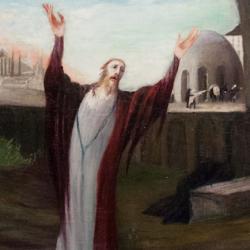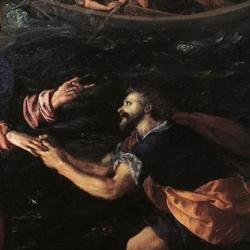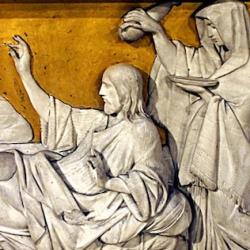INTRODUCTION
Once again Matthew records a series of three miracles, then a scene of a call to discipleship, and finally a description of the nature of Jesus’ ministry. The Jews begin to criticize Jesus, while the disciples wonder whom they are following.
THE TEXT
“Now when He got into a boat, His disciples followed Him. And suddenly a great tempest arose on the sea, so that the boat was covered with the waves. But He was asleep. Then His disciples came to Him and awoke Him, saying, ‘Lord, save us! We are perishing!’ But He said to them, ‘Why are you fearful, O you of little faith?’” . . . (Matthew 8:23-9:17).
RULER OF THE SEA
Jesus crosses the sea with His disciples, a scene reminiscent of the exodus through the Red Sea and the story of Jonah. Like Jonah, Jesus sleeps in the boat as a great “shaking” begins, “hiding” the boat (v. 24). But Jesus is greater than Jonah. In Jonah, the sea grew calm when Jonah was tossed in, but Jonah did not calm the sea. That is God’s prerogative (Job 38:8-11; Psalm 29:3-4; 65:5-7; 89:8-10). No wonder the disciples are astonished when Jesus calms the sea with a “rebuke” (v. 26). Storms of various kinds are normal for followers of Jesus, but we need not fear because Jesus rules the sea.
RULER OF SATAN
Jesus is master of the demons as well as the sea. Even the demons recognize the authority of Jesus, though they are surprised at the timing of His arrival (v. 29). They express the Jewish view that demons will have freedom to act until the end comes. With Jesus, the end has come, and particularly the end of Satan’s dominion over the creation. The fact that Jesus fights Satanic powers gives us a clue to the nature of His ministry: He comes to liberate Israel, but the main enemy He fights is not Rome but Satan. We see here for the first time that some people are unhappy with Jesus. Instead of honoring Jesus for helping the demoniacs, they ask him to leave (v. 34).
FORGIVENESS
Jesus crosses back over the sea to Capernaum, where he heals a paralytic (9:1-2). The focus of attention, though, is not on the healing but on Jesus’ authority to forgive sins. Jesus’ call of Matthew highlights the same point. Jesus welcomes tax gatherers, who cooperate with unclean Romans, into His company (v. 9). As a sign of acceptance, He reclines at the table with the rejects of Israel, tax gatherers and sinners (vv. 10-11). If He is going to heal Israel, He must spend time among the sick. He rebukes the Pharisees for their misinterpretations of Scripture, since the make right sacrifice a higher priority than compassion (v. 13).
NEW WINE
John’s disciples question Jesus about fasting. Fasting was one of the main pieties of faithful Jews. For some Jews, fasting was a way of securing forgiveness of sins. But Jesus freely offers forgiveness, so there is no need to fast. Jews also fasted during times of calamity, in hope that Yahweh would deliver them, in hope that Yahweh would turn mourning to feasting. With Jesus, the feast has started, and the old patterns no longer hold. The potent kingdom Jesus brings cannot be held in the wineskins of the law.











